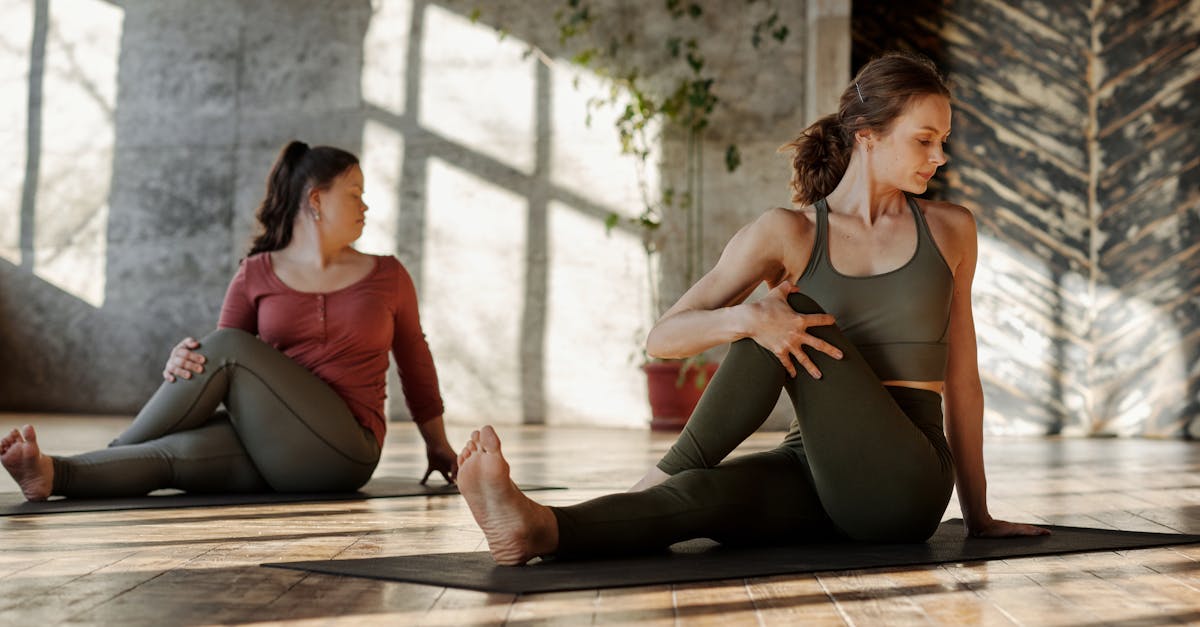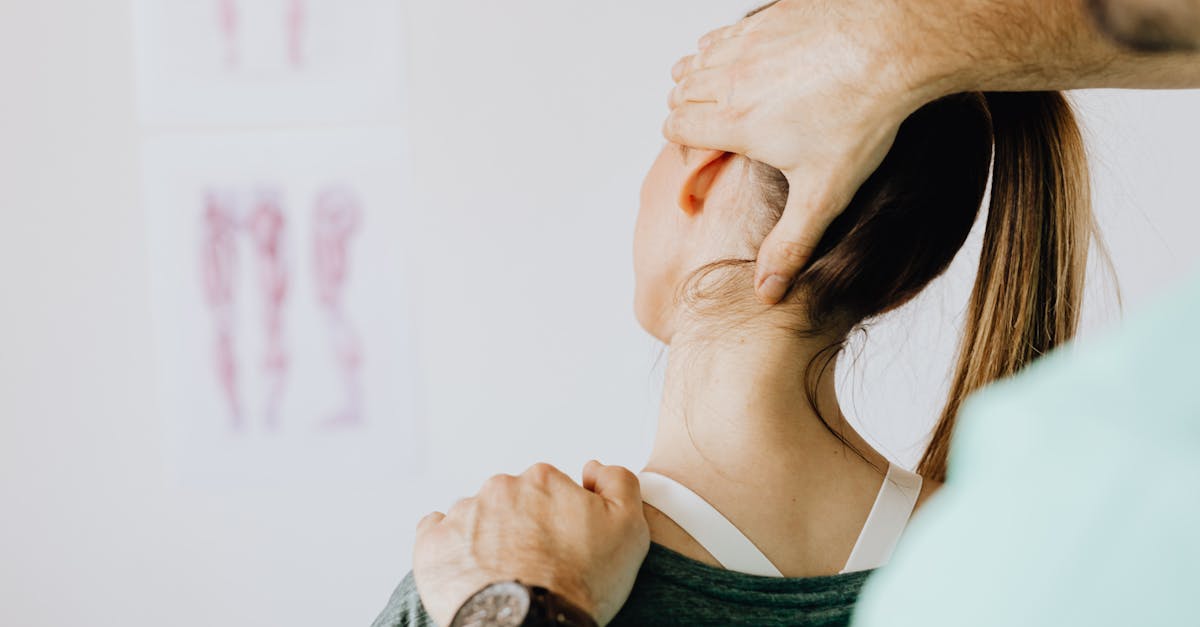In Short, improving posture is a vital investment in sustainable health that significantly benefits individuals seeking to enhance their overall well-being. By adopting better ergonomic practices, individuals can experience reduced discomfort, decreased risk of injury, and improved spinal health. This practice encourages awareness of body alignment, enabling small yet impactful adjustments that promote a more natural balance. By focusing on both environmental factors and self-awareness, people can transform their daily routines into opportunities for better< strong> wellness and greater resilience against chronic pain. |
Improving posture is not just a matter of aesthetics; it is a vital investment in sustainable health. By making conscious adjustments in our daily habits, such as maintaining an ergonomic workstation and adopting proper seating positions, individuals can mitigate discomfort and prevent future injuries. Prioritizing posture management not only enhances physical well-being but also contributes to overall spinal health, supporting a more active and productive lifestyle.

Welcome to Pulse Align, where our non-invasive and gentle approach helps restore your body’s natural balance and posture through subtle but effective recalibration techniques. Our innovative methods are designed to promote overall well-being and improve comfort levels by reducing tension in muscles and joints.
Recalibration Through Gentle Pulses
At Pulse Align, we focus on the body’s innate ability to recalibrate itself. Our services do not directly target discomfort or any medical conditions, but rather help facilitate your body’s natural processes. By promoting muscle tone symmetry and improved posture, clients often report feeling more at ease in their bodies, leading to a delightful sense of lightness and balance.
Personalized Wellness Journey
Each client’s experience is unique. We pride ourselves on offering a personalized approach, and our clients have shared wonderful testimonials about their journeys towards better posture and comfort levels. Many have noted improvements in areas such as neck and back tension, providing them with a greater sense of emotional and physical well-being without calling upon medical interventions.
Join Our Pulse Align Community
We invite you and your family, including children and pregnant women, to explore the services at Pulse Align. Our clinics, such as those located in La Prairie, Mont-Royal, and Terrebonne, are equipped with professionals committed to guiding you on your wellness journey. Visit our website to learn more about our philosophy and to book a consultation today! At Pulse Align, we work alongside your healthcare team to enhance your overall wellness, ensuring our services complement your existing care.
Medical Disclaimer
The information and advice provided on this site do not replace the advice, diagnosis, or treatment of a healthcare professional. Please consult your healthcare provider for any medical questions. For more details, visit our complete Legal Notice.
Improving Posture: A Sustainable Investment in Health
- Optimize your workspace: Adjust desk height and monitor placement to enhance ergonomics.
- Select ergonomic furniture: Invest in chairs that support your posture effectively.
- Practice dynamic sitting: Change positions regularly to avoid stiffness.
- Incorporate movement breaks: Stand, stretch, or walk every 30 minutes.
- Engage in posture exercises: Strengthen muscles that support proper alignment.
- Utilize posture reminder tools: Leverage apps or visual cues to maintain awareness.
- Educate on good posture: Inform yourself and others about the impact of alignment.
- Perform regular self-assessments: Monitor your posture throughout the day.
- Consider professional guidance: Seek advice from a chiropractor or a physical therapist.
- Embrace mindfulness practices: Use meditation to promote body awareness.

Improving Posture: An Investment in Sustainable Health
In today’s fast-paced world, our daily habits often neglect the importance of posture and ergonomics. This article explores how improving posture is not just about aesthetics or comfort; it’s a sustainable investment in our overall health that can prevent a myriad of conditions, from back pain to neuromuscular issues. By understanding the implications of our alignment, we can make informed choices that align our bodies and our well-being.
The Importance of Posture
The way we hold our bodies, both in motion and at rest, plays a pivotal role in our health. Poor posture can lead to misalignment that might contribute to chronic pain, fatigue, and long-term health problems. Research indicates that the earlier we address postural issues, the more effectively we can correct them. Good posture promotes muscle balance, decreases stress on ligaments, and enhances circulation, providing numerous benefits.
Environmental Ergonomics
One of the most influential aspects of our posture is the environment we work and live in. Adjusting your workstation for optimal comfort is essential. This includes choosing an office chair that supports your lower back, positioning your monitor at eye level, and utilizing a desk that allows for standing options. By creating an ergonomic workspace, we can significantly reduce strain and promote a more natural alignment of the body.
Investing in Ergonomic Furniture
The long-term benefits of investing in ergonomic furniture can’t be overlooked. High-quality chairs, desks, and accessories designed specifically for posture support can be an invaluable component of an effective health strategy. This investment can lead to decreased workplace-related injuries, a reduction in sick days, and improved productivity overall, which benefits both individual health and organizational health.
Postural Awareness and Movement
Incorporating movement into our daily routines can enhance postural awareness. Regularly changing positions and taking breaks from prolonged sitting or standing not only keeps the body engaged but also feeds into the holistic view of health. Aim to stand up, stretch, or walk every thirty minutes. Simple exercises like shoulder rolls, neck stretches, and hip flexor stretches can aid in recalibrating the body and relieving tension.
Strategies for Correction
Strategies to correct poor posture include practicing positive alignment through mindfulness. Awareness of your posture during everyday activities—such as driving, sitting at a desk, or using a phone—can facilitate lasting changes. Utilizing tools like posture reminder apps or even a posture-correcting belt serves as practical aids in correcting alignment and reminding individuals to maintain awareness.
Cultivating a Holistic Approach
Integrating posture improvement into a broader wellness program aligns with the principles of sustainable health practices. A holistic approach that includes neuromuscular health, symmetry, and nervous system recalibration can yield profound benefits. Techniques such as meditation and relaxation techniques can also facilitate awareness and contribute to better postural habits.
Empowering Through Education
Education plays a vital role in changing public perception regarding the importance of posture. By advocating for and sharing evidence-based insights, we can empower ourselves and others to make informed choices. Understanding how posture affects our health can motivate us to prioritize it, fostering a culture that values wellness and long-term care.
Improving Posture: An Investment in Sustainable Health
| Aspect | Focus on Wellness, Balance, and Natural Body Recalibration |
| Posture Awareness | Enhances overall well-being by promoting conscious alignment in daily movements. |
| Ergonomics | Supports balance in workspace design to facilitate natural body mechanics. |
| Movement Variety | Encourages natural recalibration through frequent changes in body position. |
| Functional Flexibility | Boosts wellness by integrating flexibility into routine for better mobility. |
| Mindfulness Practices | Enhances balance by incorporating mindfulness techniques to improve body awareness. |
| Strengthening Exercises | Promotes natural recalibration by focusing on core strength and stability. |
| Environment Adjustments | Fosters well-being through tailored adjustments that encourage proper posture. |
| Postural Checks | Regular balance assessments support long-term awareness of body alignment. |
| Community Support | Utilizes group activities to enhance natural recalibration and shared motivation. |
| Education and Resources | Equips individuals with knowledge to sustain wellness through posture improvement. |

Embarking on a Wellness Journey: Real Client Experiences with Pulse Align
Clients at Pulse Align are discovering remarkable transformations in their overall well-being through our unique approach to posture improvement. Many individuals have shared their journeys towards holistic recovery, highlighting how our methods support the body’s natural ability to recalibrate and restore balance. Feedback from clients in places like Mont-Royal and Sainte-Marie has emphasized the positive changes they’ve experienced—reporting less discomfort and improved functionality.
In Châteauguay, for example, numerous clients have expressed appreciation for how our services have not only alleviated pain but also enhanced their overall wellness journey. They appreciate the blend of practical adjustments and supportive guidance from our team, which encourages a deeper connection to their bodies.
The testimonials from individuals in regions like Terrebonne and Saint-Jérôme resonate with a common theme: our clients perceive their growth in posture awareness as a gateway to achieving a healthier lifestyle. This newfound awareness has resulted in improved spinal health and diminished tension, illustrating how prioritizing alignment can lead to lasting enhancement in daily life.
Many clients from Chicoutimi have remarked on the gradual adjustments they make, leading to substantial improvements in their physical and emotional health, empowering them to take charge of their wellness in a sustainable way. The community feedback serves as a testament to the profound impact our services have in fostering an environment conducive to healing and balance.
Furthermore, as health systems evolve, the importance of effective posture and ergonomics has become even clearer. Clients from Les Escoumins express how our team collaborates with local healthcare providers, ensuring a comprehensive approach to their wellness journey—one that supports not only the individuals but also their families as they navigate their path to health.
At Pulse Align, we invite all clients from surrounding regions, including Deux-Montagnes and Panama City, to experience the notable benefits of addressing posture within their wellness practices. As we guide clients through their journeys, we celebrate their achievements and improvements, reinforcing the notion that investing in posture correction is indeed an investment in sustainable health.
For further information about our locations and to discover how we can assist you on your wellness journey, visit our Our Clinics page. Together, let’s redefine health and restore balance in every aspect of life.
Improving Posture: An Investment in Sustainable Health
In the realm of healthcare innovation, few figures stand out as prominently as Dr. Sylvain Desforges. A seasoned expert in osteopathy, naturopathy, and manual medicine, he has devoted his career to improving patient outcomes through a blend of advanced techniques and holistic approaches. As the founding president of both the TAGMED clinics and the ACMA association, Dr. Desforges is committed to enhancing health and well-being through evidence-based practices that prioritize the patient’s overall posture and physical alignment.
Dr. Desforges is particularly renowned for his expertise in managing chronic pain, an area where many individuals struggle and seek long-term relief. His philosophy integrates the latest advancements in medical technology, including spinal decompression, laser therapy, and shockwave therapy. Each of these modalities offers distinct benefits for realigning the body and mitigating pain, creating an innovative approach to treatment that is both effective and sustainable for his patients.
The importance of maintaining a healthy posture cannot be overstated, especially given the prevalence of sedentary lifestyles in modern society. Many people spend hours at their desks or engaged in activities that can lead to poor alignment and discomfort. Dr. Desforges emphasizes that an investment in posture is synonymous with an investment in sustainable health. By prioritizing proper body mechanics, individuals can enhance their quality of life and experience profound changes in their overall well-being.
Patients at TAGMED clinics receive tailored care that focuses on their unique postural challenges. Dr. Desforges and his team utilize comprehensive assessments to identify areas of concern and develop personalized treatment plans that foster optimal spinal health. Education plays a pivotal role in his approach; patients are taught about the significance of good posture and ergonomic practices that they can incorporate into their daily lives.
In his efforts to support patient wellness, Dr. Desforges also advocates for proactive strategies that prevent pain before it becomes chronic. Simple changes, such as periodic breaks from sitting and practicing mindful movements, can have a significant impact on one’s posture. His goal is to empower patients with the knowledge and tools necessary to take control of their health and posture, ultimately leading to greater resilience against injury.
As a fixture in the field of healthcare, Dr. Desforges continues to inspire those around him through his relentless pursuit of excellence. His innovative methods and commitment to patient-centric care reflect a paradigm shift in how chronic pain and posture-related issues are perceived and addressed. He firmly believes that by fostering an environment where posture is prioritized, individuals can unlock the potential for a healthier, more active lifestyle.
For those eager to explore new avenues for improving their posture and overall health, learning more about Dr. Desforges’ approach and the offerings at TAGMED clinics is a unique opportunity. Embracing the notion that good posture is not merely a cosmetic concern, but an essential aspect of sustainable health, Dr. Desforges champions a message that resonates with many seeking lasting change.
Neurovertebral Decompression Technology from TAGMED
Mechanism of Action
The neurovertebral decompression technology offered by TAGMED operates by applying a controlled and progressive traction force on the spine. This innovative approach effectively increases the space between vertebrae, reducing the pressure on both intervertebral discs and nerve roots. By doing so, it facilitates improved circulation of fluids in the targeted area. This crucial process helps decrease inflammation and alleviates pain, providing much-needed relief for patients suffering from chronic discomfort or conditions such as disc herniation, disc bulging, and moderate to severe spinal or foraminal stenosis.
Specific Benefits
This non-invasive method offers a highly effective means to relieve chronic pain and associated symptoms linked to the aforementioned conditions. Neurovertebral decompression not only reduces stress on nerve structures but also optimizes fluid circulation around the discs. As a result, patients often experience quicker recovery times and improved quality of life. This technology represents a significant advancement in the pursuit of pain relief, allowing individuals to engage in their daily routines with renewed vigor.
Comparison with Other Treatments
When examining the efficacy of TAGMED’s neurovertebral decompression technology, it is essential to compare it with other commonly employed therapeutic approaches to manage conditions affecting posture and spinal health, such as analgesics, corticosteroid injections, surgical interventions, and traditional physical therapy. The unique advantages of neurovertebral decompression include its non-invasive nature, which minimizes the risks commonly associated with medication and surgical procedures. Moreover, many patients experience faster recovery times, allowing them to return to normal activities without the prolonged downtime associated with more invasive methods.
Case Studies or Testimonials
Numerous patients have reported significant improvements after undergoing neurovertebral decompression therapy with TAGMED. Testimonials often highlight substantial reductions in pain levels, faster resumption of daily activities, and decreased reliance on pharmacological treatments. These case studies illustrate the profound impact that this technology can have on enhancing the well-being of individuals facing chronic pain and associated symptoms.
Improving Posture: An Investment in Sustainable Health
Investing in improved posture transcends beyond mere aesthetics; it is a crucial step towards achieving sustainable health. Maintaining proper alignment is essential not only for physical comfort but also for enhancing overall well-being. A commitment to improving one’s posture can yield profound benefits that reverberate throughout daily life.
When individuals prioritize postural awareness, they often discover that the benefits extend to various aspects of their existence. By introducing ergonomic adjustments to workstations, utilizing ergonomic furniture, and establishing healthy seating positions, people can create an environment conducive to better posture. This investment reduces the likelihood of developing chronic pain, which can lead to increased productivity and efficiency in both personal and professional tasks.
Moreover, the importance of frequently changing positions during prolonged sitting cannot be overstated. Simple habits, such as taking breaks every thirty minutes, can have a significant impact on sustaining a relaxed yet supported posture. These habits not only prevent discomfort but also contribute to heightened mental clarity and focus throughout the day.
Ultimately, the journey toward better posture is a continuous process. It is never too late to embark on this path, as even incremental improvements can lead to lasting changes. By integrating techniques such as posture-correcting exercises, mindfulness practices, and posture reminders into daily routines, individuals can actively combat the negative impact of a sedentary lifestyle.
In essence, improving posture is not merely a personal endeavor; it is a collective pursuit for sustainable health within communities. By prioritizing and investing in our postural health, we contribute to a holistic approach that champions wellness and resilience for current and future generations.

Do you suffer from a chronic condition that responds little or not at all to conservative treatments?
In today’s fast-paced world, our bodies often bear the brunt of stress, leading to various discomforts that can be challenging to manage. At Pulse Align, we proudly present a non-invasive and innovative method designed to help restore the body’s natural balance and posture through gentle, imperceptible pulses. This progressive approach addresses the topic of well-being from a natural perspective, allowing the body to naturally minimize muscle or joint tension, creating space for peace and stability.
It’s essential to understand that at Pulse Align, our focus is not on discomfort or conditions themselves, but rather on how we can support the body in recalibrating itself naturally. Many clients find that this approach brings about remarkable improvements in their overall sense of well-being, helping them achieve a more aligned posture and greater comfort in their daily activities.
What sets Pulse Align apart is our personalized approach tailored to each client’s unique needs. Individuals have shared inspiring testimonials highlighting how our services have positively influenced their overall wellness, including notable enhancements in areas such as neck and back tension, as well as general body awareness. These narratives underscore the importance of regaining balance and alignment, focusing on the body’s natural abilities to enhance comfort.
We invite you to explore Pulse Align’s services by visiting our website, where you can find locations near you in cities like La Prairie, Mont-Royal, and Terrebonne, among others. You can easily book a consultation for yourself or your family. Remember, Pulse Align is intended to complement, not replace, the healthcare services you may already be engaged with. Our emphasis on safe, non-invasive techniques is designed to integrate seamlessly with your existing wellness routines.
At Pulse Align, we strive to help each individual regain the symmetry of normal muscle tone, fostering a holistic journey towards enhanced well-being. Our proprietary technology works tirelessly to create balance, catering to both your comfort and your lifestyle, including accommodating families and individuals at various stages of life.
To learn more about our services and book an appointment, visit our website: Pulse Align. Experience the difference of a family-friendly approach that values your health and wellness as much as you do.
Frequently Asked Questions
Posture Imbalance, body misalignment
How do I maintain achieved progress?
Continue exercising, stay attentive to daily posture, and have regular check-ups with a professional.
Can postural imbalance cause fatigue?
Yes, maintaining poor posture requires more muscular effort, leading to increased fatigue throughout the day.
Can postural imbalance cause digestive issues?
In some cases, poor posture can compress internal organs and influence digestion, causing discomfort and bloating.
Can wearing orthotics help correct postural imbalance?
Yes, in some cases, orthopedic insoles or braces can help balance the body and reduce compensatory posture patterns.
How does body misalignment affect health?
It can cause chronic pain, muscle fatigue, reduced mobility, headaches, and a decreased quality of life.
Can I correct postural imbalance at home?
Yes, targeted exercises, stretching, massage, and being mindful of your daily posture can help, but professional guidance is recommended.
Can a mirror help correct my posture?
Yes, observing yourself in a mirror helps identify asymmetries and adjust your position in real-time.
Can children suffer from postural imbalance?
Yes, heavy backpacks, poor posture habits, and rapid growth can lead to imbalance in children.
Are massages helpful for improving body alignment?
Massage can relax tense muscles, improve circulation, and facilitate postural adjustments, especially combined with targeted exercises.
Can mobile apps help improve posture?
Yes, some apps offer reminders, exercises, and visual assessments to help correct posture.
Victor Guillot knows that life’s pains can often be traced back to the way we sit, stand, and move. As a Posture Awareness Advocate at Pulse Align, he’s committed to showing readers how small adjustments in alignment can bring big relief. With a blend of empathy and evidence-based research, Victor translates the science of posture into practical steps that help ease discomfort, protect against injury, and restore natural balance. He believes that everyone deserves to feel strong, stable, and pain-free—and through his writing, he offers the guidance and encouragement to help readers reach that goal.
Medical Disclaimer
The information and advice provided on this site do not replace the advice, diagnosis, or treatment of a healthcare professional. Please note that the author of this article is neither a doctor nor a specialist in a medical specialty as defined by the Collège des médecins du Québec. Manual medicine, functional medicine, and sports medicine as described on this site exclude any medical treatment or diagnosis made by a doctor or medical specialist. Always consult your doctor for any medical questions. For more details, please read our complete Legal Notice.




